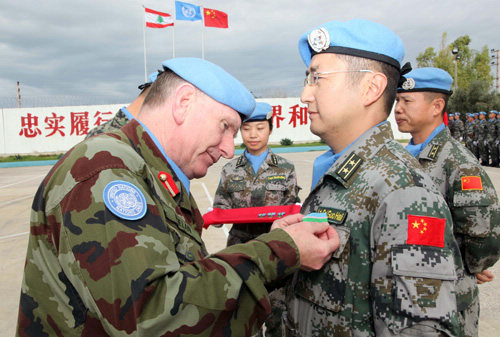|
 |
|
PIECE OF HONOR: Chinese members of a UN peacekeeping force receive service medals from a UN official at a military camp in Lebanon on December 5, 2012 (LIU SHUN) |

The UN General Assembly approved an increase of about 5 percent to cover the UN's regular operations in 2012-13 at the end of December 2012, raising the two-year budget to $5.4 billion. At the same time, the assembly approved new rates that all UN members pay for the regular budget.
As newly emerging economies, China, Russia, Brazil and India agreed to hefty increases of their UN dues. According to the new rates, China will pay an extra 61 percent in UN fees, taking its share of the budget from 3.19 to 5.15 percent. It will overtake Canada and Italy to become the sixth biggest UN contributor.
The large increase of payments will undoubtedly constitute a heavy burden for China, as its economy has not been immune to the severe impact brought on by the global financial crisis and the ensuing European debt crisis. Since the share is set according to China's growing capability, the nation is willing to accept the new rate and fulfill its corresponding international responsibilities.
The continuing rapid development of China has given the international community higher expectations regarding China's assumed responsibility for UN contributions. However, though China has become the second largest world economy, its per-capita GDP still ranks behind 100 countries in the world. Therefore, it is reasonable and fair for China to continue receiving the preferential policy rate intended for "low per-capita countries." Given the fact that China remains a developing country, it would be one-sided if the international community exaggerates the country's international responsibilities based simply on its GDP.
During the assessment of member states' dues proposed by the Fifth Committee (Administrative and Budgetary) of the UN General Assembly, China and other emerging countries firmly supported the principle of respective capabilities. Chinese Deputy Permanent Representative to the UN Wang Min said the scale of assessments of the UN must be formulated strictly in accordance with respective capabilities of each country. Determining a country's capacity to pay requires a comprehensive and integrated perspective that takes into account both the gross national income and, more importantly, the per-capita income of the country. While the former is the basis, the latter is the decisive factor.
Given the differences among countries in terms of size, development stage, level of economic growth and wealth owned by nationals, it is only natural that different countries have varying capacities to pay. With developing countries constrained by a weak economic foundation and the onerous task of poverty eradication, it is fair to say that they are leagues behind developed countries in terms of overall living standards. Ignoring per-capita income and using only gross national income to measure the actual capacity to pay is partial and unfair.
A population of 150 million in China lives under the UN-set poverty line. Chinese representatives to the UN appealed that the country's capacity to pay should be evaluated in an objective and reasonable way and should not be separated from the nation's conditions and the overall international economic environment.
A proper increase of China's UN payment at this time is reasonable. It is the embodiment of the country's growing financial capacity due to the fast growing economy and the enhanced comprehensive national strength.
In fact, with the continuous promotion of China's comprehensive national strength since the introduction of the reform and opening-up policy at the end of the 1970s, the country's UN payment share has continuously risen—significantly more so since the beginning of the 21st century. Since then, China's UN payment share has increased from 0.995 percent before 2000 to 5.15 percent. The number is expected to rise after 2015.
The increase of China's UN fees would be conducive to promoting its international status, image and influence. Chinese Foreign Ministry spokeswoman Hua Chunying said the increasing share shows that China is a responsible power. As its payment share is above 5 percent, critical voices accusing China of paying "too little" UN fees as a permanent member of the UN Security Council will be weakened. The number of Chinese employees in UN organizations will increase, which will help to bolster the voice of China.
| 